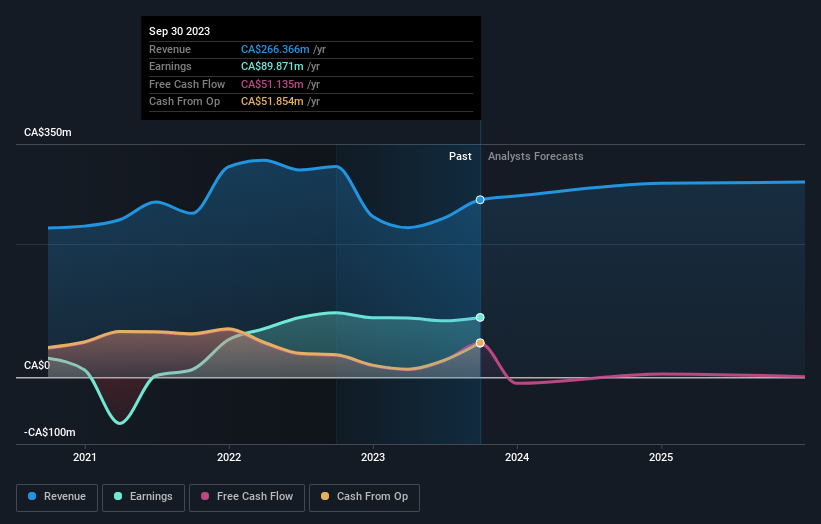Private companies account for 52% of Melcor Developments Ltd.'s (TSE:MRD) ownership, while individual investors account for 26%
Key Insights
Melcor Developments' significant private companies ownership suggests that the key decisions are influenced by shareholders from the larger public
51% of the company is held by a single shareholder (Melton Holdings Ltd)
Insiders have bought recently
If you want to know who really controls Melcor Developments Ltd. (TSE:MRD), then you'll have to look at the makeup of its share registry. And the group that holds the biggest piece of the pie are private companies with 52% ownership. That is, the group stands to benefit the most if the stock rises (or lose the most if there is a downturn).
Individual investors, on the other hand, account for 26% of the company's stockholders.
Let's delve deeper into each type of owner of Melcor Developments, beginning with the chart below.
See our latest analysis for Melcor Developments

What Does The Institutional Ownership Tell Us About Melcor Developments?
Institutional investors commonly compare their own returns to the returns of a commonly followed index. So they generally do consider buying larger companies that are included in the relevant benchmark index.
As you can see, institutional investors have a fair amount of stake in Melcor Developments. This can indicate that the company has a certain degree of credibility in the investment community. However, it is best to be wary of relying on the supposed validation that comes with institutional investors. They too, get it wrong sometimes. When multiple institutions own a stock, there's always a risk that they are in a 'crowded trade'. When such a trade goes wrong, multiple parties may compete to sell stock fast. This risk is higher in a company without a history of growth. You can see Melcor Developments' historic earnings and revenue below, but keep in mind there's always more to the story.

Hedge funds don't have many shares in Melcor Developments. The company's largest shareholder is Melton Holdings Ltd, with ownership of 51%. This implies that they have majority interest control of the future of the company. With 7.4% and 4.6% of the shares outstanding respectively, Timothy Melton and Industrial Alliance Investment Management Inc. are the second and third largest shareholders. Timothy Melton, who is the second-largest shareholder, also happens to hold the title of Chief Executive Officer.
While studying institutional ownership for a company can add value to your research, it is also a good practice to research analyst recommendations to get a deeper understand of a stock's expected performance. While there is some analyst coverage, the company is probably not widely covered. So it could gain more attention, down the track.
Insider Ownership Of Melcor Developments
The definition of company insiders can be subjective and does vary between jurisdictions. Our data reflects individual insiders, capturing board members at the very least. Management ultimately answers to the board. However, it is not uncommon for managers to be executive board members, especially if they are a founder or the CEO.
Insider ownership is positive when it signals leadership are thinking like the true owners of the company. However, high insider ownership can also give immense power to a small group within the company. This can be negative in some circumstances.
It seems insiders own a significant proportion of Melcor Developments Ltd.. Insiders have a CA$46m stake in this CA$347m business. This may suggest that the founders still own a lot of shares. You can click here to see if they have been buying or selling.
General Public Ownership
The general public, who are usually individual investors, hold a 26% stake in Melcor Developments. This size of ownership, while considerable, may not be enough to change company policy if the decision is not in sync with other large shareholders.
Private Company Ownership
We can see that Private Companies own 52%, of the shares on issue. It might be worth looking deeper into this. If related parties, such as insiders, have an interest in one of these private companies, that should be disclosed in the annual report. Private companies may also have a strategic interest in the company.
Next Steps:
It's always worth thinking about the different groups who own shares in a company. But to understand Melcor Developments better, we need to consider many other factors. Case in point: We've spotted 3 warning signs for Melcor Developments you should be aware of, and 1 of them is significant.
If you are like me, you may want to think about whether this company will grow or shrink. Luckily, you can check this free report showing analyst forecasts for its future.
NB: Figures in this article are calculated using data from the last twelve months, which refer to the 12-month period ending on the last date of the month the financial statement is dated. This may not be consistent with full year annual report figures.
Have feedback on this article? Concerned about the content? Get in touch with us directly. Alternatively, email editorial-team (at) simplywallst.com.
This article by Simply Wall St is general in nature. We provide commentary based on historical data and analyst forecasts only using an unbiased methodology and our articles are not intended to be financial advice. It does not constitute a recommendation to buy or sell any stock, and does not take account of your objectives, or your financial situation. We aim to bring you long-term focused analysis driven by fundamental data. Note that our analysis may not factor in the latest price-sensitive company announcements or qualitative material. Simply Wall St has no position in any stocks mentioned.
